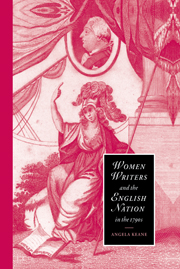Book contents
- Frontmatter
- Contents
- Dedication
- Acknowledgements
- Chapter 1 Introduction: Romantic belongings
- Chapter 2 Domesticating the sublime: Ann Radcliffe and Gothic dissent
- Chapter 3 Forgotten sentiments: Helen Maria Williams's ‘Letters from France’
- Chapter 4 Exiles and émigrés: the wanderings of Charlotte Smith
- Chapter 5 Mary Wollstonecraft and the national body
- Chapter 6 Patrician, populist and patriot: Hannah More's counter-revolutionary nationalism
- Afterword
- Notes
- Bibliography
- Index
- CAMBRIDGE STUDIES IN ROMANTICISM
Chapter 4 - Exiles and émigrés: the wanderings of Charlotte Smith
Published online by Cambridge University Press: 22 September 2009
- Frontmatter
- Contents
- Dedication
- Acknowledgements
- Chapter 1 Introduction: Romantic belongings
- Chapter 2 Domesticating the sublime: Ann Radcliffe and Gothic dissent
- Chapter 3 Forgotten sentiments: Helen Maria Williams's ‘Letters from France’
- Chapter 4 Exiles and émigrés: the wanderings of Charlotte Smith
- Chapter 5 Mary Wollstonecraft and the national body
- Chapter 6 Patrician, populist and patriot: Hannah More's counter-revolutionary nationalism
- Afterword
- Notes
- Bibliography
- Index
- CAMBRIDGE STUDIES IN ROMANTICISM
Summary
SILENT EXILE: “DESMOND” AND THE LIMITS OF COSMOPOLITANISM
On 19 July 1790, a young Englishman wrote a letter from Paris to his mentor in England, to report with ‘the most heartfelt satisfaction, that nothing is more unlike the real state of this country, than the accounts, which have, been given of it in England’. Like his countrywoman Helen Maria Williams, the young man had been overwhelmed by the ‘animating spectacle’ of the 14th July storming of the Bastille, and could only conjecture that the ‘scenes of anarchy and confusion’ which were being circulated in England ‘have no existence but in the malignant fabrications of those who have been paid for their mis-representations’. The English public, he now understood, was being duped by its government's agents provocateurs.
The letter from a young gentleman in Paris is fictional, taken from Charlotte Smith's novel of 1792, Desmond. It is part of a correspondence between the eponymous hero, Lionel Desmond and his guardian, Erasmus Bethel, which makes up one strand of the epistolary novel that marked a turning point in Smith's fictional writing. It was her first overtly political novel and the only work of British fiction to comment directly on the events of the French Revolution as they unfolded.
- Type
- Chapter
- Information
- Women Writers and the English Nation in the 1790sRomantic Belongings, pp. 81 - 107Publisher: Cambridge University PressPrint publication year: 2001

